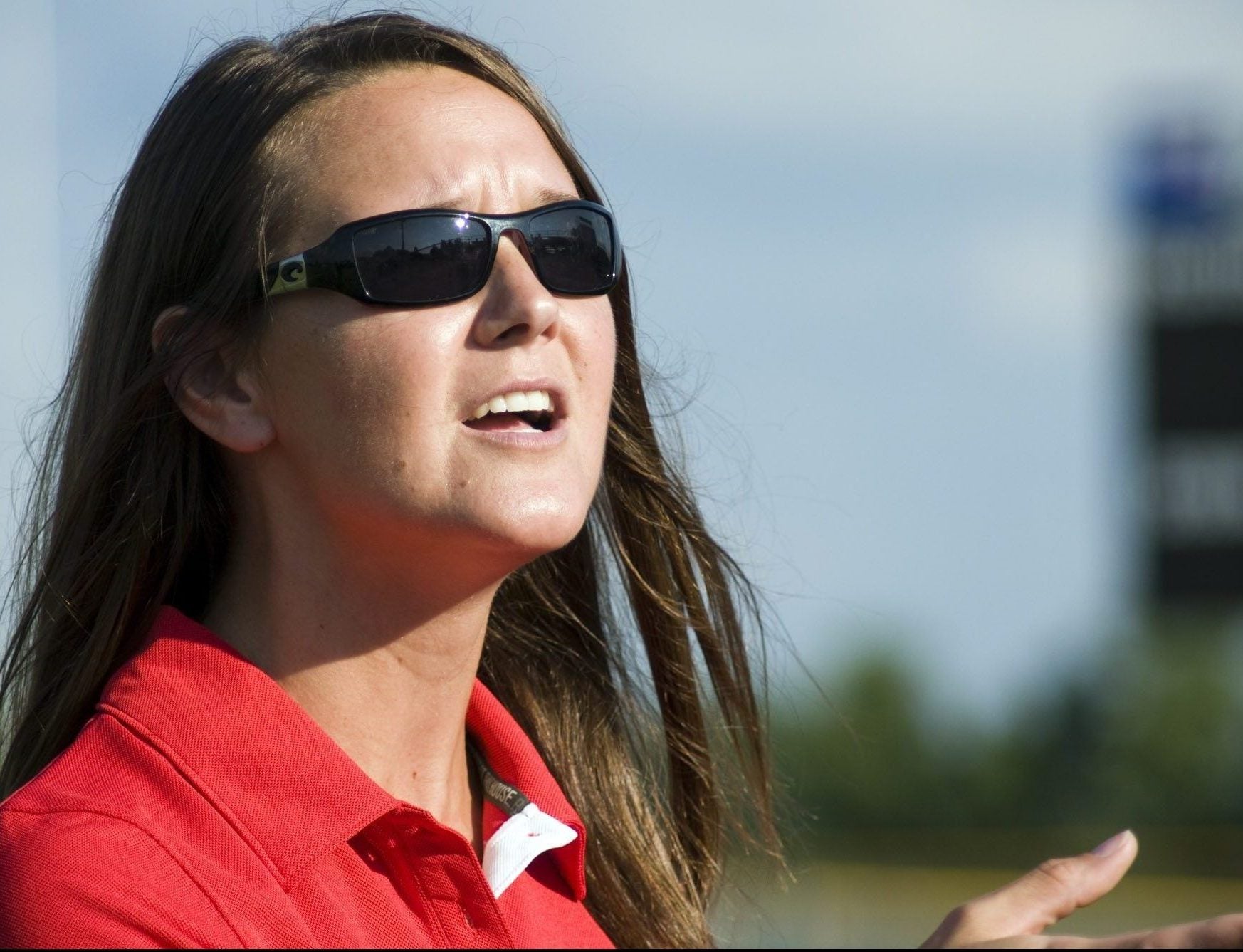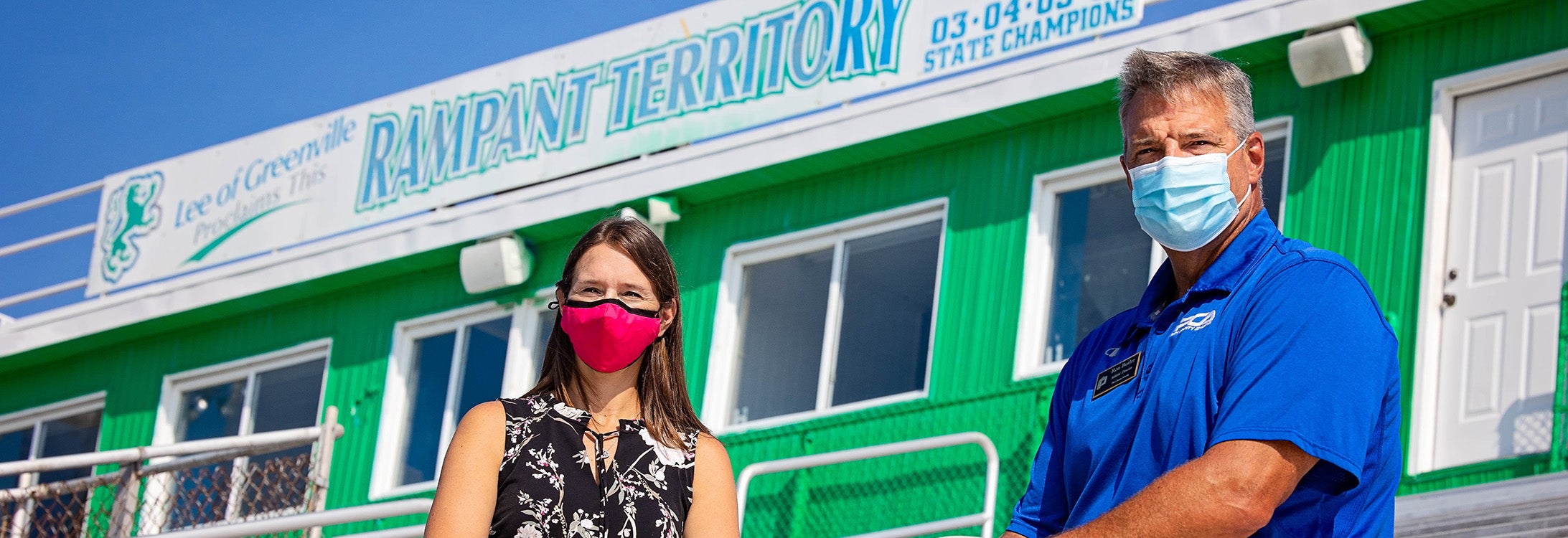TRIUMPH THROUGH TRAGEDY
ECU, Pitt County Schools partnership recognized with national honor
Ask any group of football fans what triggers their gridiron passion and they’ll point to a specific memory.
It may be the first morning of crisp fall air after a sweltering North Carolina summer.
A screeching whistle as a referee reaches for the bright yellow flag to signal a penalty.
Or the pebbled feel of the pigskin leaving their hand as they throw the first pass of the season to a friend in the back of a makeshift endzone.
East Carolina University associate professor Sharon Rogers Moore’s love of the sport is fueled by something different — keeping high school athletes safe.
Her work with local athletes, school administrators and state legislators was recognized this month by the Engagement Scholarship Consortium with its Excellence in Community Partner Engagement Award. Presented after a national nomination process, the honor highlights the partnership that ECU and Moore have with Pitt County Schools. This partnership has impacted athlete safety in meaningful ways both at home and across the state.
The partnership began with a happenstance meeting at a conference more than 100 miles from Greenville more than 10 years ago. Today it endures and protects Pitt County athletes on the field while preparing North Carolina’s next generation of athletic trainers.
Tragic Tipping Point
Moore’s tenure with ECU’s College of Health and Human Performance was beginning its second year in 2008 after arriving in Greenville from a postdoctoral stint at Duke University Medical Center.
Two miles south of campus, four-time state title winner J.H. Rose was three games into its football season. The Rampants’ offense was headlined by 16-year-old star running back Jaquan Waller. Waller was trying to lead his team to an early 3-1 record with a victory over Hoggard High School.
Waller didn’t survive the game.
After sustaining a head injury from a concussive blow two days earlier in practice, he was cleared to play by the school’s injury management specialist after sitting out for only 24 hours. During Friday’s contest against the Vikings, Waller was hit again. That impact, coupled with his previous injury, caused his brain to swell.

Moore’s partnership with Pitt County Schools began in 2008 after the tragic death of J.H. Rose football player Jaquan Waller. Since their partnership began, the school system has placed certified athletic trainers at each of Pitt County’ six high schools. The model has been adopted across much of North Carolina.
(Contributed by Sharon Rogers Moore)
Twenty minutes later he arrived at the hospital and was put on life support. Seventy-two hours after the initial hit, Waller died from brain death due to a subdural hematoma and swelling of the brain. The autopsy report revealed that the injury was preventable.
“I remember reading the newspaper and learning of the tragedy,” Moore said. “A colleague brought it into work and shared it with me. The situation was simply heartbreaking.”
Waller was the third North Carolina high school football player to die just a month into the season.
The state, and the sport, was reaching a tipping point when it came to athlete safety. The win-at-all-costs culture surrounding football was antiquated. A chance meeting between Moore and newly appointed county athletic director Ron Butler quickened the pace of Pitt County football’s paradigm shift.
“Everyone was uneasy,” Butler said. “We were all worrying that another tragedy would occur without knowing how to prevent it.
“Months later in March 2009, I attended the North Carolina Athletic Directors Conference in Wilmington and Sharon was a guest speaker. I knew we could partner that day when I discovered we both wanted the same thing — for athletes to participate in the safest way possible with medical experts covering our teams.”
Changing the Culture
It’s common for players in all sports to play hurt. While a spotlight was starting to shine on research into the dangers of repeated head injuries in the National Football League and at the collegiate level, figuring out a way to protect athletes locally was still a challenge.
“There was a national interest in this topic and, unfortunately, Greenville was at the center of it,” Moore said. “Head injuries were managed poorly at all levels of sports when this partnership was born. Thankfully, the culture in sports has evolved to recognize player safety as the priority, but there is always more work to be done.”
Moore knew that the transition toward a greater focus on player safety wouldn’t be easy. She couldn’t do it alone.
“When I first met with Ron, I’d just completed ECU’s inaugural Engagement and Scholarship Academy (EOSA) program,” Moore said. “The program selects faculty to participate in workshops and develop a research project with a community partner. Working with the community was fresh on my mind.”
Moore’s background and research in athletic training, exercise, cognitive function and dementia proved pivotal for Pitt County. Butler’s access to the county’s athletic programs was mutually beneficial for ECU.
Working hand-in-hand, the pair developed a comprehensive sports medicine program for the county’s six high schools. The program places ECU athletic training students at athletic events under the supervision of licensed athletic trainers, providing schools, athletes and coaches medical experts on the sideline.
Instead of coaches and players making split-second, life-altering health care decisions during games and practices, a new level of protection was available to mitigate tragedies like Waller’s from happening again.
“We are beyond fortunate to live in a community with a plethora of medical resources that responded alongside our growing partnership,” Moore said. “It has taken many years to build a network of community medical professionals who are informed about, and engaged in, sports medicine.
“Initially we faced funding challenges. The money allocated for an athletic training staff with adequate supplies at individual schools across the county varied from too little to nonexistent. However, Pitt County responded with tremendous commitment to this effort and has been a partner in the truest sense ever since.”
The partnership’s recommendations on athlete safety have been adopted by many counties in North Carolina. The pair have developed a website to educate parents, athletes and coaches on sports-related injuries. Additionally, they’ve organized an 18-member sports medicine advisory committee which informs the county school system’s medical management policies. Moore has even been recognized by the National Academy of Inventors for developing a scale that provides repeated weight assessments of athletes to monitor their hydration.
Positive Policies
Today, North Carolina ranks third in the country for state high school sports safety policies by the University of Connecticut’s Korey Stringer Institute. The institute provides research, education and advocacy to prevent sudden athlete deaths.
State policies have been adopted to prevent cases of traumatic head injuries, heat stroke and sudden cardiac arrest. In 2011, the state adapted the Gfeller-Waller Concussion Awareness Act, which shares half its name with Rose’s former running back, which requires athletes showing head injury symptoms to be pulled immediately out of play and to be examined before returning to the field.
Moore knows that without the Pitt County community and the strong bond built among ECU and its partners, these changes wouldn’t have been possible.
“The culture shift I mentioned earlier isn’t an easy change for coaches,” Moore said. “The coaches we work with deserve so much credit. They have responded favorably to all of the safety measures we’ve put into place.
“The parents of Pitt County student-athletes deserve so much praise as well for their receptiveness to the medical management policies and practices that have been implemented over the last decade. Following the tragedy, parents certainly had fears and concerns, but they trusted the schools and our team to take care of their children. We appreciate the parents for trusting us in this way.”
Moore’s research also enables future athletic trainers to receive on-the-job training, building the state’s next generation of athletic caretakers.
Myranda Fields, a 2016 Pirate alumna who serves as the head athletic trainer at Carrboro High School in Carrboro, said the partnership Moore built with Pitt County changed the trajectory of her career.
“Sharon’s work with the school system allowed me the opportunity as a student to shadow and explore a different setting to practice my skills in outside of Division 1 athletics,” Fields said. “Having these opportunities early on is actually what pushed me into my career of being a high school athletic trainer.
“I do believe this partnership has made athletics safer in this state. In my eyes, it’s the gold standard for high school athletic training. Having a medical community come together and work to provide the best care for athletes, without a hidden agenda, is amazing. Having access to all these resources that some athletes may not have had access to without their athletic trainer being at the school is an incredible thing.”
Commitment to Community
With the 11th year of the partnership on the horizon, Butler believes that athletic care in the county will continue to improve.
“I believe partnering with Sharon has led to Pitt County being the best and safest place to participate in athletics in North Carolina and probably the country,” Butler said. “My hope for the partnership is that it outlasts Sharon and myself.”
Partnerships like Moore’s and the Pitt County Schools’ aren’t rare at ECU. The university has made it a priority to support research that empowers eastern North Carolina communities. Engaged research, like the kind in which Moore participates, aims to align faculty and students alongside community partners to solve local problems.
“Throughout its history, ECU has responded to the needs of communities across eastern North Carolina and beyond,” said Sharon Paynter, assistant vice chancellor for economic and community engagement. “Our motto is ‘to serve’ and our mission focuses on student success, public service and regional transformation. This partnership is the embodiment of both motto and mission. It demonstrates the power of applying cutting edge research to real-world problems.”
The recognition from the Engagement Scholarship Consortium — which includes 42 national academic institutions including the likes of the University of Alabama, Michigan State University, Virginia Tech and Ohio State University — is a byproduct of ECU’s commitment to community.
“We are humbled by the recognition and we are proud of our work,” Moore said. “It’s been my pleasure to apply my expertise to impact so many youth athletes. I truly enjoy high school sports and am grateful for the part I play in keeping athletes on the field.”
RELATED:
ECU associate professor elected to National Academy of Inventors Senior Members Class
